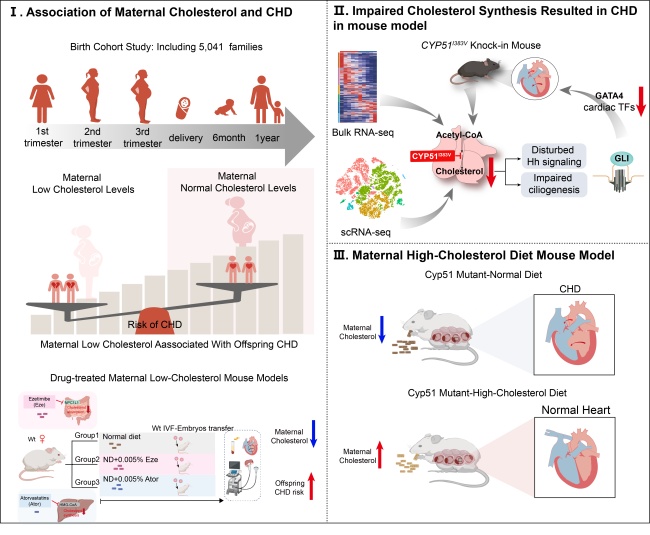Congenital heart disease (CHD) is the most common birth defect worldwide and a leading cause of infant morbidity and mortality, yet the etiology of most cases remains unknown. Cholesterol, long recognized as an essential structural component of cell membranes and a key signaling molecule in embryonic development, has long been suspected to influence cardiac morphogenesis, but direct evidence linking maternal cholesterol levels to CHD risk has been lacking.
A recent study led by Professor Zhibin Hu at Nanjing Medical University, published in Signal Transduction and Targeted Therapy and titled “Maternal cholesterol deficiency predisposes congenital heart defect risk,” provides the first comprehensive evidence that low maternal cholesterol during pregnancy significantly increases CHD risk in offspring. By integrating a large-scale birth cohort data with mechanistic mouse models, the team delineated the full causal chain from maternal cholesterol deficiency to cardiac malformations and further demonstrated that maternal cholesterol supplementation can effectively mitigate this risk.
Based on a prospective birth cohort of 5,041 family trios, the researchers identified a clear U-shaped association between maternal cholesterol level and CHD risk. Mothers in the lowest cholesterol tertile during the second and third trimesters faced substantially higher risks of having a child with CHD--1.52-fold and 1.73-fold higher, respectively, compared with the reference group.
To validate this findings experimentally, the team induced cholesterol deficiency in pregnant mice using the cholesterol absorption inhibitor ezetimibe and a statin. Both interventions markedly increased CHD incidence in the offspring.
Because statin exposure is rare among pregnant women in clinical practice, the researchers sought genetic evidence that could mimic naturally occurring low-cholesterol conditions. Whole-genome sequencing of 103 children with CHD identified a functionally damaging variant in CYP51A1 (c.1147A>G; p.Ile383Val), a key enzyme in the cholesterol synthesis pathway, that showed significant association with CHD. Building on this discovery, the team generated a Cyp51I383V knock-in mouse model, which not only reproduced the CHD phenotype observed in humans but also revealed the underlying mechanism: the mutation impaired cholesterol synthesis, disrupted ciliogenesis, and inhibited Hedgehog signaling—an essential pathway for cardiac development, and ultimately led to septal defects and myocardial thinning.
Notably, the researchers further discovered that providing a high-cholesterol diet to pregnant mice carrying the Cyp51I383V mutation markedly reduced CHD incidence in their offspring. This finding suggests that appropriate maternal cholesterol supplementation may offer a feasible and promising prenatal intervention for reducing CHD risk, particularly in genetically susceptible pregnancies.
This study is the first to systematically integrate human epidemiological data with genetic and mechanistic animal studies to identify maternal cholesterol deficiency as a significant—and potentially modifiable—risk factor for congenital heart defects. The work not only deepens current understanding of cholesterol’s role in cardiac development but also lays a scientific foundation for future maternal nutritional interventions aimed at the precise prevention of CHD.
Associate Professor Yayun Gu, Dr. Jimiao Gao, Lecturer Hong Lv, Dr. Yan Zhou, and Associate Professor Tao Jiang are co–first authors of the paper. Professor Zhibin Hu is the corresponding author. Special thanks go to Professor Steven Y. Cheng from Basic Medical Sciences for his guidance in study design and manuscript preparation.

(Drafted and translated by Professor Zhibin Hu’s research team; Translation revised by Bei Zhang)



